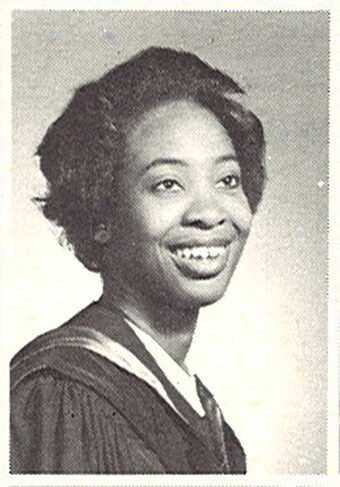U of M’s First Black Female Medical Student
Dr. June Marion James grew up in the ethnically diverse British Colony of Trinidad and Tobago. The daughter of educators, she remembers sitting on her grandmother’s back verandah, plying her with questions about family, careers, and the country’s politics. Granny told young June the story of her uncle, a young cadet and pre-med student who contracted typhoid at a soccer game and infected his two sisters. Her grandparents were told to prepare for three funerals. The girls — Dr. James’ aunt and her mother — made it home from the hospital, but her uncle did not. Her grandmother implored her, “June, you have the brains to do medicine and we need a doctor in the family.” Subconsciously, medicine was always a career consideration for her and Dr. James credits her Granny with inspiring her to be a self-sufficient woman.

The first Black woman to attend the University of Manitoba, Dr. James graduated with her BSc in 1963 and, while offers for medical school came from across North America, she chose to get her MD at the U of M, where she would be blazing a trail as the only Black woman and one of only 6 women in the program. She remembers her greatest struggle in medical school was absorbing all the knowledge required to pass her exams. Just like many female physicians, balancing work with raising a family was one of her greatest obstacles, but she credits her supportive (late) husband with helping her achieve work-life balance.
She started her career as a Paediatric Fellow in Hematology and Oncology, but when breakthroughs were made in treating asthma and allergies, she turned her attention toward this sub-specialty in 1972. Her meticulous focus on professionalism and dedication to the best science available guided her interactions and are the hallmarks of her career.
She does remember some instances in which the colour of her skin may have impacted her interactions with patients and colleagues. For example, during internship, she had difficulty with a particular nurse who was reluctant to carry out Dr. James’ written orders. A firm reminder that the nurse colleague was required to follow her instructions seemed to remedy the situation. While working at the Winnipeg Clinic, she encountered a patient who seemed especially surprised to be seen by a Black female physician. Dr. James went about her professional duties, and at the end of the visit, the patient told her that he was impressed with her professional acumen.
She developed Manitoba’s first ever Family Asthma Program. The six-week program, which included nurses, a play therapist, a karate teacher, and other partners, helped parents anticipate the needs of children living with asthma and taught the pediatric patients breathing exercises and how to properly use their inhalers. Before this program children were often hospitalized or advised not to participate in sports and its success was measured in the rapid decline in hospital admissions and an increase in asthmatic children participating in their chosen sports.
“…embrace the unknown, work hard to achieve your goals, avoid getting side-tracked and trust in God.”
Her years spent as a successful and respected physician and leader in the medical community are a result of her commitment to fostering good working relationships with colleagues and being involved with administration. Dr. James credits her active listening skills and empathy, her willingness to learn, allocating time for herself and family, and having a reasonable grasp of societal trends with her long and successful career.

Dr. James has advice for Black youth considering a career in medicine. Do not get frightened or overwhelmed by the perceived length of time to study medicine. Take it one step at a time and take advantage of bursaries and scholarships. When the medical community reflects the communities it serves, patient outcomes are better, and youth may be inspired when they see their own reflection in their doctor. If she could give young June advice, she would encourage her to embrace the unknown, work hard to achieve your goals, avoid getting side-tracked and trust in God.
Dr. James is now happily retired. The collegial group of the class of 1967 remains close, meeting often – lately over zoom – to reminisce about medical school, their careers, and now retirement. As a group, they have created a scholarship fund for medical students.
In gratitude for the bursaries that benefited her as a medical student, Dr. James established the June Marion James bursary at The Winnipeg Foundation. The annual bursary goes to an International student at St. Johns College at the University of Manitoba.
In addition to having held roles as President of the Manitoba Museum and Manitoba Museum Foundation, the College of Physicians and Surgeons of Manitoba from 2002 – 2003 and the Congress of Black Women of Manitoba, Dr. James was a professor at the Rady Faculty School of Medicine and in 2000 she was named Physician of the Year by the MMA (now Doctors Manitoba). In 2020 she was named an honouree of the 100 Accomplished Black Canadian Women. In 2021 she received the Manitoba Women Trailblazer Award, she was named to the Order of Manitoba in 2004, is a recipient of the Queen Elizabeth 50th Jubilee Medal, and in 1981 she received the YWCA Woman of Distinction Award (Professional category) for her work developing the Family Asthma Program.